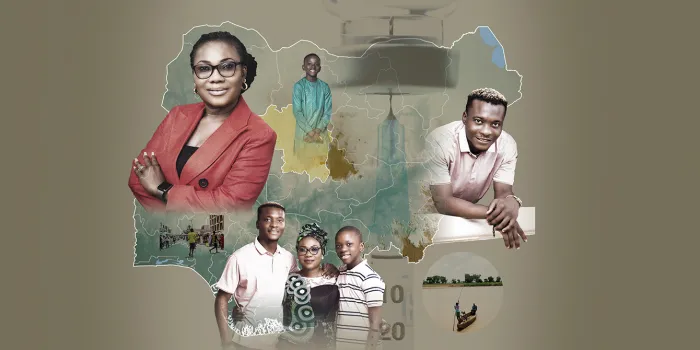Although my great-grandmother lost four sons to post-circumcision bleeding and my grandmother lost nine sons the same way, I’d never heard the word “hemophilia” until my son Timothy was 21 months old. I live in Nigeria, and hemophilia was not commonly diagnosed here.
Timothy needed his first blood transfusion at 15 days old, then again at 4 months and again at 9 months. Then, when he was 21 months old, doctors took a blood sample from his thigh, and the bleeding wouldn’t stop. After over 12 hours of trying to control the bleed, he had to be transfused.
A doctor at that hospital finally diagnosed Timothy with hemophilia. He said my baby wouldn’t live past age 3. Hemophilia was like a death sentence here in Nigeria.
But I refused to just go home and count the days until my son died. I made call after call and found the South African Haemophilia Foundation. They told me that Timothy needed clotting factor, but it was expensive and unaffordable for any individual family to purchase. That drove me to search for other organizations that might be able to help. I found 67 organizations and sent my story to every one of them. Finally, I got an email back from the World Federation of Hemophilia (WFH), which agreed to donate factor for my son.
They sent more than my son could use, so I set out to find other families with hemophilia. We don’t have social workers here, so I went to the local hospital and got a list of children with hemophilia. I contacted every one of them and told them I had a treatment.
In 2005, I started the Haemophilia Foundation of Nigeria (HFN), with my son as the only member. Since then, it has become the go-to resource here, with 575 members today.
Healthcare in Nigeria is generally provided by the government. But because hemophilia had never been officially recognized, patients here depended 100% on donated treatment products. Through a lot of effort, things have begun to change. In recent years, we were able to get Nigeria to officially recognize hemophilia. We are so glad it finally happened, but we still have a way to go. Next up is the establishment of policies and a strategic plan, which will be done by representatives from the government, WFH and HFN, among others.
These days, Timothy is doing well, as is my second son, Isaac, who also has hemophilia. They still have bleeds often, but now they can both manage their bleeds and can infuse themselves. Timothy graduated from college with a degree in computer science in 2019, and Isaac is in eighth grade.
When Timothy was diagnosed, I had one goal, and that was to keep him alive. Today, my goal is to make sure that people in Nigeria with bleeding disorders live a normal life and no longer have to worry about whether or not there are enough donations to go around to every patient in the country. We are now one step closer.

